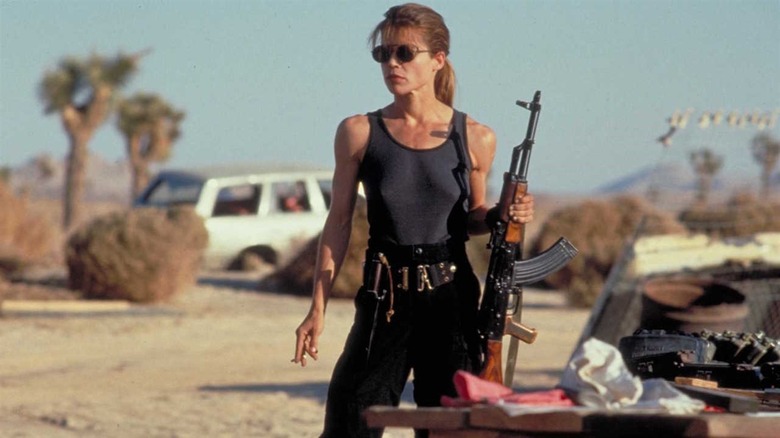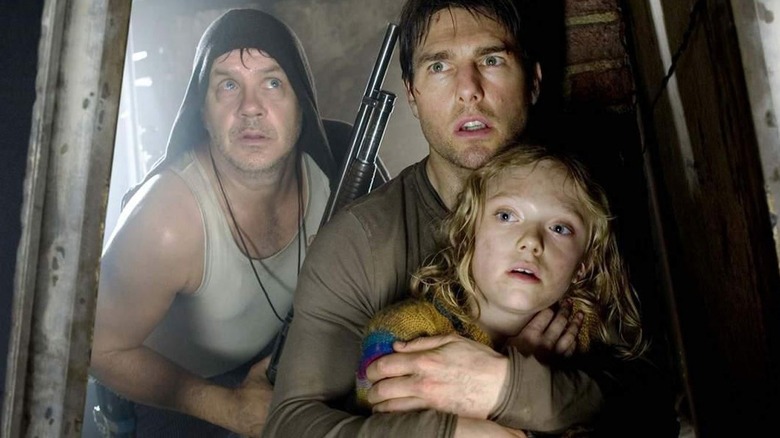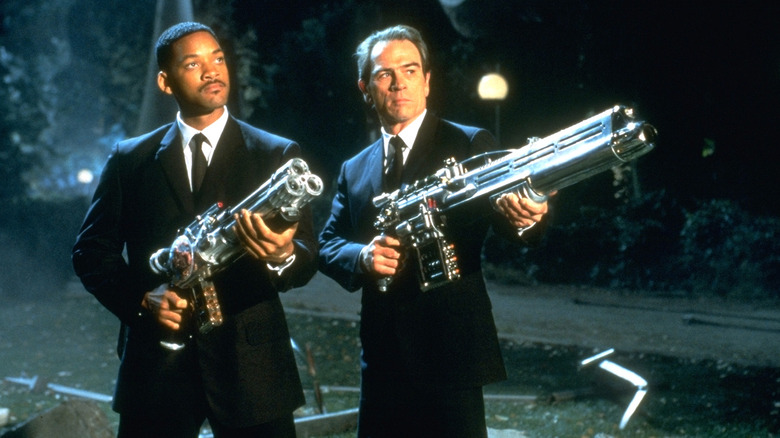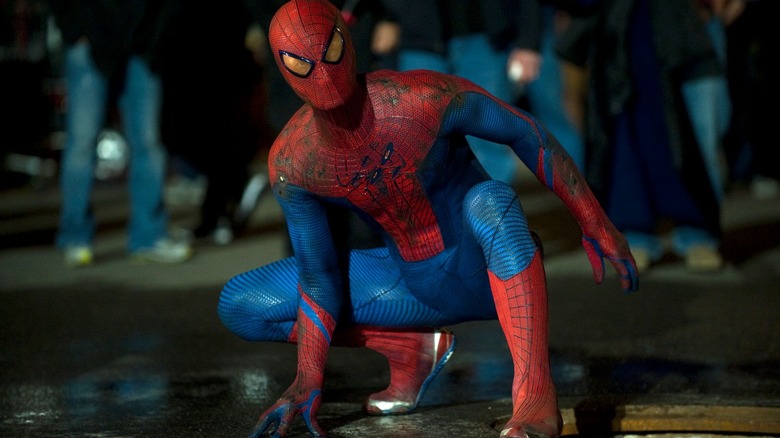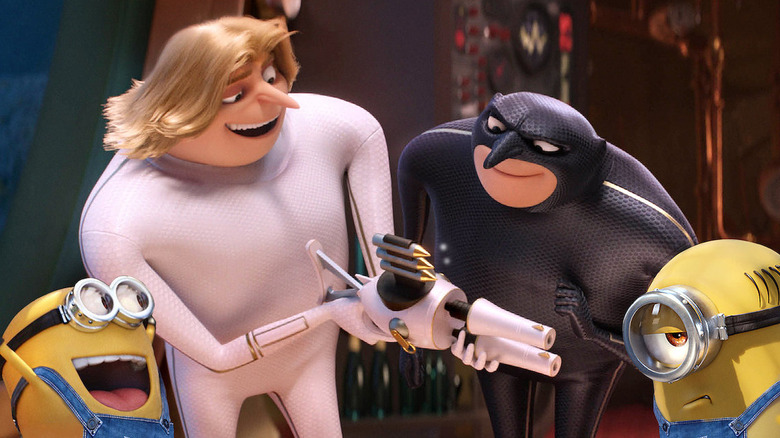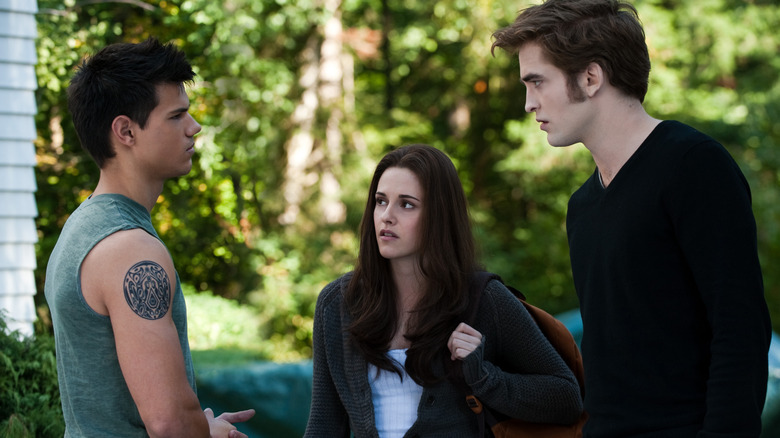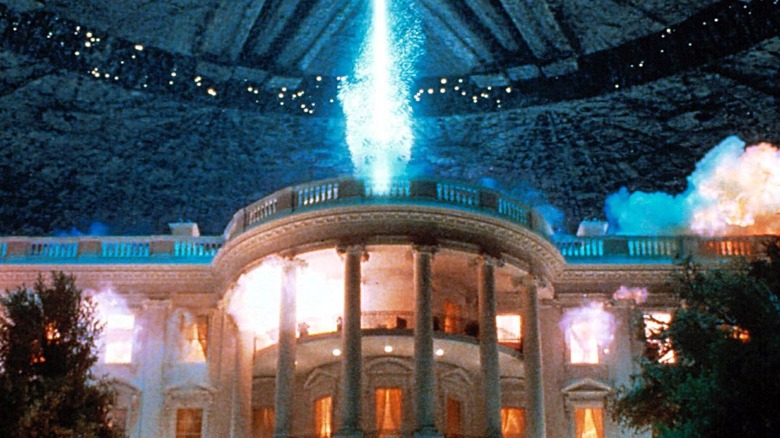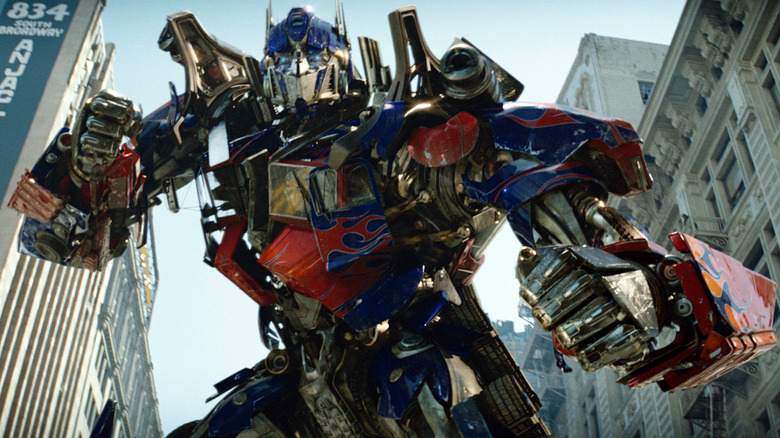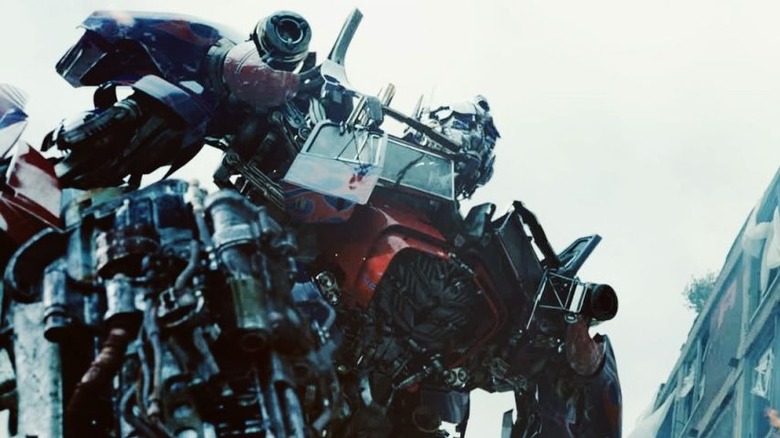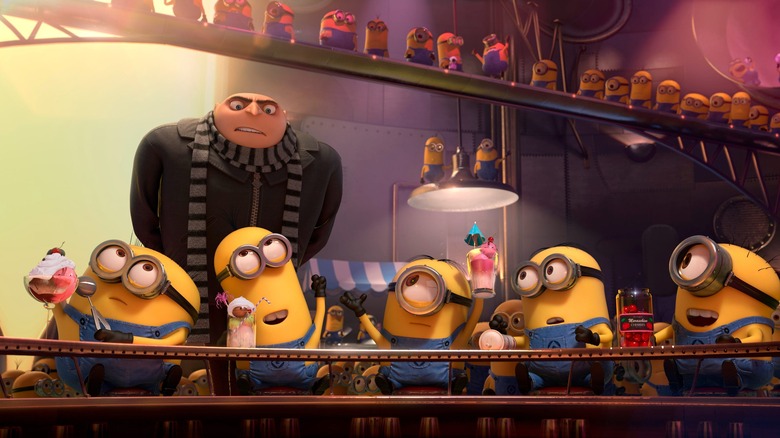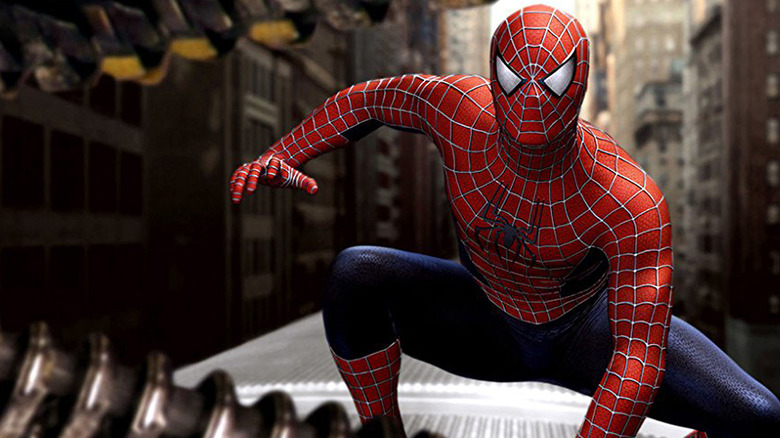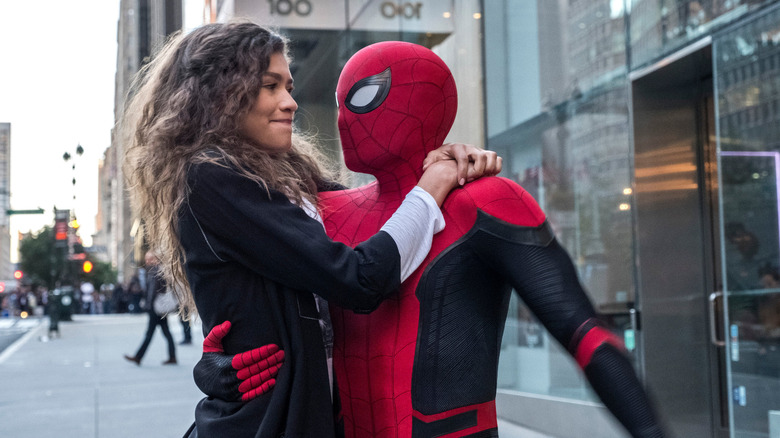The Highest-Grossing 4th Of July Weekend Movie Releases Of All Time
Fireworks aren't the only entertainment provided on Independence Day. Movie studios have used this holiday weekend as a go-to place to launch mega-blockbusters for decades now. Located smack dab in the heart of the summer, this patriotic holiday is the optimal spot to launch movies that can serve as not just the must-see events of the 4th of July timeframe but also the entire season. While certain holidays throughout the year have managed to be a hotspot for R-rated titles, most of the biggest movies that have opened over the 4th of July weekend have been PG-13 blockbusters, to take advantage of how large families tend to gather for this holiday and need something to do once the barbequing is over.
The dominance of family-friendly fare is just one of many distinct traits that become apparent when examining the highest-grossing movies at the domestic box office that have opened over the Independence Day weekend. At the same time, there are also totally unique factors that have informed the incredible box office success of these particular features, which range from clever marketing techniques to being a sequel to an especially beloved movie. Whatever the reason for their success, the biggest movies over this holiday frame reflect just how successful the Independence Day weekend has been for launching blockbusters.
Terminator 2: Judgement Day
When he said "I'll be back," he meant it. Arnold Schwarzenegger returned to his most iconic role for "Terminator 2: Judgment Day," a blockbuster that built on seven years of anticipation for more "Terminator" movies. While the original "Terminator" hadn't broken domestic box office records, it had become a favorite of many and developed enough of a following to warrant a follow-up. Over that time, Schwarzenegger had turned into a movie star who could get butts into seats without any issue. Similarly, James Cameron had also increased his profile over this period, going from the unknown filmmaker of 1984 to somebody recognized in 1991 as a blockbuster auteur who reliably pushed the art of filmmaking forward.
To satisfy fan demand and live up to his reputation, James Cameron wasn't planning to just make a normal sequel that rehashed the original. "Terminator 2" was a significantly bigger affair that offered a large-scale action movie instead of the original's low-key thriller. This change was reflected in the film's Independence Day opening weekend debut. Cameron planned to deliver a cinematic fireworks show over this holiday frame. The promise of unprecedented spectacle and all the love for the original "Terminator" gave "Judgment Day" a massive $203.4 million domestic total. It was a stunning gross that broke several box office rules, including the ones that stated how big R-rated films could go. Norms like that get easily shattered, though, when you finally making good on being "back."
Hancock
"Hancock" was that rare thing in the American movie marketplace, a major superhero movie that wasn't based on a pre-existing property. Then again, it didn't need a Marvel Studios or DC Comics logo on its poster considering it was headlined by Will Smith at the peak of his movie star fame. Throughout the first decade of the 21st century, Smith was guaranteed to get audiences into the theater to see all kinds of projects, so of course people wanted to see him as a tormented pastiche of Superman.
The appeal of Smith as that kind of superhero ensured that "Hancock" was a big hit when it opened over the 4th of July frame in 2008, as it grossed $227.9 million domestically. That's an impressive sum in its own right as well as something that puts the North American box office hauls of many superhero movies adapted from pre-existing material to shame.
War of the Worlds
"War of the Worlds" was a fusion of massive talent. Steven Spielberg, one of the most famous filmmakers ever, would be directing Tom Cruise, an enormous movie star, in an adaptation of one of the most iconic sci-fi novels to ever grace bookshelves. It's no wonder, then, that the film was greeted with a massive amount of hype prior to its release. It was just the kind of spectacle-laden blockbuster the Independence Day weekend had become well-known for housing.
In its debut, "War of the Worlds" topped the box office and scored the second-biggest Independence Day weekend haul at that time, only behind "Spider-Man 2." This set the title up for a strong domestic gross, which would eventually amount to $234.2 million. Among his directorial efforts, this makes "War of the Worlds" Spielberg's fifth-highest grossing movie in North America. It also still stands as Cruise's biggest feature ever in that territory. Even with all the sky-high expectations stemming from all the talent assembled, "War of the Worlds" still stood out as a notable box office achievement.
Men in Black
Nowadays, the "Men in Black" franchise isn't in the best shape. The series hit such a high in its first installment that it never could quite recapture that box office magic again, especially with recent entries like "Men in Black: International." But wow, did "Men in Black" get off to the kind of dazzling start that few other franchises can boast. The presence of Will Smith and Tommy Lee Jones as the leads as well as the unique action/comedy tone in its advertising drew in moviegoers like moths to a flame. It also helped that it was debuting over the 4th of July weekend, where leading man Smith had just headlined another action blockbuster, "Independence Day," one year prior.
Much like that 1996 Roland Emmerich movie, "Men in Black" proved to be a lucrative venture and grossed $250.6 million domestically. This haul was enough to make it the highest-grossing movie of 1997 not set on a sinking boat and immediately give birth to a franchise. Though its sequels haven't been quite as lucrative, "Men in Black" still stands as an impressive box office performer.
The Amazing Spider-Man
It's been well-known for decades now that Spider-Man can spin a web any size, catch thieves just like flies, and basically do anything a spider can. But in 2012, the question surrounding this character was whether or not he could survive a recasting. After a trio of beloved movies starring Tobey Maguire, Sony Pictures/Columbia opted to start the "Spider-Man" series over with a whole new cast and filmmaker. The resulting film would be none other than "The Amazing Spider-Man," which saw Andrew Garfield donning the mask for his first of two appearances as Spider-Man.
Though critical marks were more mixed than the ones given to Sam Raimi's first "Spider-Man" movie, "The Amazing Spider-Man" was still a lucrative venture. That was made clear from its first day of business, which grossed a whopping $35 million. An impressive debut in its own right, this sum also set a record for how much money a single movie could gross on a Tuesday. Its success was not limited to just opening night moviegoers, though. Eventually, "The Amazing Spider-Man" would gross $262 million domestically. While that was below its trio of predecessors, it was still above most other superhero movies and also more than sizable enough to make it a hit for all involved. With this kind of box office performance, it turned out that surviving a controversial recasting is also one of Spider-Man's many superpowers.
Despicable Me 3
The "Despicable Me" franchise returned to dominate the summertime moviegoing season over Independence Day weekend in 2017 with the third installment, "Despicable Me 3." If there was a downside to this one's $264.4 million domestic gross, though, it did show the franchise returning to lower levels than its predecessor domestically. Whereas "Despicable Me 2" and "Minions" both cleared $330 million in North America with ease, the gross for "Despicable Me 3" was more akin to the $257 million haul of the original "Despicable Me." At least in North America, Gru and his minions weren't quite as immediately beloved as they were just two years prior.
Still, $264 million is nothing to sniff at, especially since it left all other animated movies in 2017 in the dust. Nothing else from Pixar Animation Studios or DreamWorks Animation in that year could hope to even come close to "Despicable Me 3." It also ended 2017 as the eighth-biggest film of any kind domestically, surpassing the likes of "Logan" and "Dunkirk" for that honor. On top of everything else, the movie's eventual domestic sum proved again how fruitful the Independence Day weekend could be for launching blockbusters. It was a step down from its predecessors, sure, but there were still many positives in the domestic gross of "Despicable Me 3."
The Twilight Saga: Eclipse
Four out of the five "Twilight" movies opened in the pre-Thanksgiving corridor. That's always been a great spot to release movie adaptations of young adult novels, as all the "Hunger Games" sequels and several "Harry Potter" installments can attest. But the "Twilight" franchise went rogue in 2010 by releasing the third installment in this series, "Eclipse," over a timeframe outside of November. For this entry in the franchise, "Twilight" opted for a 4th of July launch, with "Eclipse" debuting against "Knight and Day" and "The Last Airbender."
Despite opening in new territory, the appeal of the "Twilight" movies meant that "Eclipse" didn't miss a beat at the box office. On the contrary, "Eclipse" hit an all-time high at the domestic box office that no other feature in the franchise has surpassed. Grossing $300.5 million domestically, "Eclipse" had no trouble turning romantic angst into something that could be just as big as the action-packed summertime blockbusters. This gross also meant that "Eclipse" is the only "Twilight" movie to make more than $300 million in North America. You don't need to be a box office expert to understand why "Eclipse" was a moneymaker: "Twilight"-mania was at peak levels in 2010. This film could have opened in the deepest recesses of January and still emerged as one of the year's highest-grossing features. Pre-Thanksgiving had been a great home for "Twilight" but it's not the only place these movies excelled financially.
Independence Day
Today, it's hard not to mention the term "Independence Day" without getting visions of Bill Pullman delivering an iconic speech or Randy Quaid sacrificing himself to save the planet. But back in 1996, "Independence Day" was full of unproven qualities that could have sunk the entire production if things didn't go right. This was Will Smith's first time headlining a big-budget film and Roland Emmerich had also yet to make a name for himself as the go-to filmmaker for expensive disaster fare. Both were just coming into their own back in 1996.
However, 20th Century Fox found a way to get around all that uncertainty. The film incorporated a marketing campaign that was totally unprecedented at the time, including a historic Super Bowl commercial as well as iconic imagery on its poster of the White House exploding. Suddenly, the film that once looked like a question mark became a box office juggernaut. The summer of 1996 was defined by "Independence Day," which grossed $306.1 million domestically. That's still one of Smith's highest-grossing movies in North America and also one of the most lucrative 20th Century Fox titles in history. Sometimes, it takes a couple of unknowns to totally change the box office.
Transformers
The first live-action "Transformers" movie begins with Optimus Prime booming the line "Before time began..." in voice-over narration. It's interesting he says that because it actually feels like the "Transformers" movies have now been going on since "before time began." But this long-running franchise had to start somewhere and it kicked off its lengthy run in 2007 with "Transformers." Believe it or not, there was actual trepidation over this blockbuster, namely concern over the viability of making a big-budget tentpole based on a toy.
Turns out, though, that audiences didn't really care where "Transformers" came from. They just cared about how enticing the film looked in its marketing, which promised that the "Transformers" were hiding in plain sight throughout human history. These enticing promos captured the imagination of the public at large rather than just appealing solely to the already-existing "Transformers" fan base. Another point in this blockbuster's corner was opening over Independence Day weekend, which allowed word-of-mouth to flourish during gatherings over this holiday timeframe. With all these qualities at its back, "Transformers" turned its questionable source material into a gargantuan $319.2 million domestic gross. That was enough to surpass the North American hauls of other more established blockbusters from that same summer, such as "Pirates of the Caribbean: At World's End." It was also the kind of sum that can inspire a franchise to seemingly never end.
Transformers: Dark of the Moon
There was a remarkable level of consistency across the original trilogy of "Transformers" movies in their box office grosses. While they all didn't make the same amount of money, they all grossed between $318 and $402 million domestically. Critics were never highly fond of these films but these inaugural installments at least provided something audiences responded to, judging by how consistently they showed up for them. Among the reliable successes in this franchise was the 2011 installment "Transformers: Dark of the Moon."
Though it made less domestically than its predecessor, "Revenge of the Fallen," "Dark of the Moon" had no problem brightening up the domestic box office with an enormous $352.3 million gross. Marketing that promised high-level spectacle in the city of Chicago, as well as the novelty at the time of seeing these robots duke it out in digital 3D, made sure the original trilogy of "Transformers" movies went out with a financial bang. It helped, too, that "Dark of the Moon" was the only major live-action blockbuster opening over Independence Day weekend that year. With no other tentpoles in sight, Optimus Prime and company could rule over the box office and reaffirm the financial stability of these early "Transformers" movies.
Despicable Me 2
Not all animated sequels are chart-topping box office sensations. Even "Despicable Me" animation house Illumination has experienced this phenomenon thanks to "The Secret Life of Pets 2" making considerably less than its predecessor. But that wasn't the case with "Despicable Me 2." The original "Despicable Me" had touched a nerve when it hit theaters in 2010 and turned a $56 million opening weekend into a $255+ million domestic gross. That kind of word-of-mouth indicated that audiences were practically salivating for more of Gru and his minions.
The movie that would meet that demand was "Despicable Me 2." Whereas the first "Despicable Me" bowed over the second weekend of July, this follow-up reflected just how big this franchise had become by opening over the 4th of July frame. This gave it the kind of launch most other movies, animated or otherwise, would envy. In its first five days, "Despicable Me 2" amassed $143.1 million, more than any other animated film over that same timeframe. Eventually, "Despicable Me 2" would gross $368 million domestically, far above its predecessor and all other Illumination titles. An animated sequel won't inherently become a hit, but "Despicable Me 2" showed that it sure doesn't hurt following up on a beloved movie.
Spider-Man 2
While J. Jonah Jameson may be convinced that Spider-Man is a "menace," the superhero is anything but that at the box office. This character is a reliable moneymaker, as proven by the 2004 feature "Spider-Man 2." Following on the heels of the record-shattering 2002 film "Spider-Man," this movie had sky-high expectations to live up to. As a result, this one's marketing focused on one of Spidey's most famous foes, Doctor Octopus, and promises of Peter Parker's personal life colliding with his superhero identity to entice audiences to take another spin.
Opening over the 4th of July frame in 2004, "Spider-Man 2" immediately got off to a splendid start by dethroning its predecessor for the honor of biggest opening day gross in history. From there, the news just kept on getting sweeter for this blockbuster as "Spider-Man 2" grossed $180 million in its first six days of release. This beastly box office gross would have been impressive under any circumstances. However, it was especially outstanding given how it blew away all past Independence Day opening hauls as well as the box office grosses of most other summer 2004 tentpoles. Eventually, "Spider-Man 2" snagged a $373.5 million domestic gross, a sum as spectacular as its titular superhero.
Spider-Man: Far From Home
Ever since the Marvel Cinematic Universe kicked off back in 2008, all MCU titles have opened on a Friday. There's never been a publicly divulged reason for this, but given how often titles in this saga have scored such impressive opening weekends, it's likely Marvel Studios doesn't want to dilute potentially record-breaking bows by opening on a Wednesday. This tradition got upended for the third Marvel Cinematic Universe feature of 2019, "Spider-Man: Far from Home." Once set to open just a day after Independence Day, Sony Pictures shifted the title's debut up to Tuesday July 2, mimicking the Tuesday launch of the 2012 film "The Amazing Spider-Man."
It was an incredibly unorthodox maneuver for a Marvel Studios release but it ended up paying off handsomely. This was clear from the get-go, when "Far from Home" amassed $39.3 million on opening day, the biggest Tuesday gross in history. It then proceeded to spin $185.1 million over its first six days of release, a gargantuan total. That kind of impressive box office speaks to both the allure of Spider-Man on the big screen as well as just how many moviegoers show up to multiplexes over this holiday weekend. In the end, "Far from Home" grossed $389 million domestically, enough to become the second-biggest entry in the "Spider-Man" franchise in North America. Looks like shifting off Friday wasn't a bad move at all for this Marvel Cinematic Universe entry.

